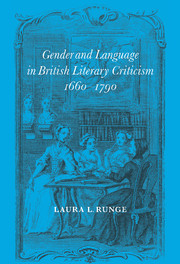1 - Manly words on Mount Parnassus
Published online by Cambridge University Press: 15 September 2009
Summary
Women we have often eagerly placed near the throne of literature: if they seize it, forgetful of our fondness, we can hurl them from it.
Critical ReviewEighteenth-century British writers metaphorically represent literary excellence as a throne or mountain, indicating a place of honor raised above the hordes of undistinguished writers. Exactly who gains access to that hallowed ground forms the subject of earnest debate throughout the period. The terms of the controversy reflect the configurations of power in critical authority, and the discourse of gender frequently supplies a language of definitive polarities.
In The Battle of the Books (c. 1697, 1704), Jonathan Swift memorably demonstrates the utility of gendered codes in the figure of Criticism, a composite of bestial and misogynist imagery who champions the Moderns over the Ancients in the contest for Mount Parnassus.
The goddess herself had claws like a cat; her head, and ears, and voice, resembled those of an ass; her teeth fallen out before, her eyes turned inward, as if she looked only upon herself; her diet was the overflowing of her own gall; her spleen was so large, as to stand prominent, like a dug of the first rate; nor wanted excrescencies in form of teats, at which a crew of ugly monsters were greedily sucking.
On the one hand, the image stimulates revulsion toward Criticism by distorting the creature's female body in beastly analogues with supernumeraries unmodestly exposed.
- Type
- Chapter
- Information
- Publisher: Cambridge University PressPrint publication year: 1997

